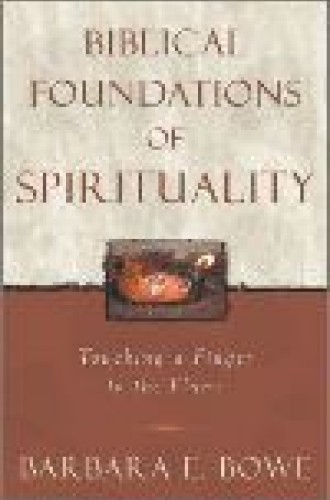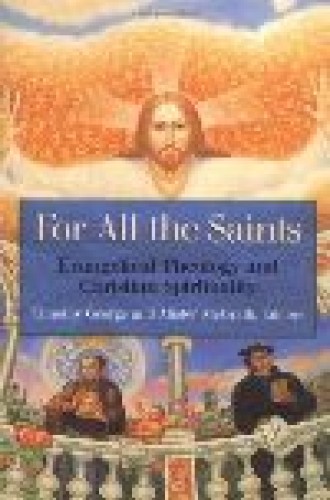A surge of spirituality
Interest in spirituality keeps rising and expanding like a yeasted lump of dough. Since the secular 1960s put forth their stout challenge to the place of God in “a world come of age,” spirituality has come back to life and is steadily asserting its claim on ordinary saints in the churches—and has even dared to venture into the academy.
Sociological studies have revealed that baby boomers have an intense interest in spirituality, their negative attitudes toward institutional religion notwithstanding. Gen Xers, persons born between 1965 and 1977, seem to follow suit, though their critique of religion is not as sharp as that of the boomers.
Where is this surge of interest in spirituality headed? These books give us some hints.
Spirituality is not an easy term to define in today’s religious climate, but among the many efforts to do so, one salutary direction is evident: a return to biblical and historical roots. Barbara Bowe’s Biblical Foundations of Spirituality and Bradley Holt’s Thirsty for God not only encourage this return very competently, but do so in a manner that makes their books useful for seminary and college classes, church study groups, retreats and individual study. Questions at the end of each chapter make both books particularly valuable for hands-on learning. Holt also includes end-of-chapter spiritual exercises. Notes, indexes and well-selected bibliographies enable readers to move beyond a beginner’s level.
Bowe, professor of New Testament at the Catholic Theological Union in Chicago, has done a remarkable job of extracting major insights from the immensely variegated corpus of Hebrew and Christian scriptures and showing how they speak to our present condition both individually and corporately. Employing spirituality as “an all-inclusive term to speak about a way of life lived in response to the divine spirit,” she moves deftly through not only the complex field of biblical studies but also the vast arenas of Christian history, spirituality and theology to put together a coherent portrait.
What would a contemporary spirituality grounded in the scriptures look like?
According to Bowe’s apt summary of her discussion of the Hebrew Bible, it would always witness to “the unfathomable mystery at the heart of God” and show profound awareness of human creatureliness; it would balance an understanding of God as mighty to save with a perception of God as One who is in the midst of life to bless; it would draw repeatedly on the metaphor of the Exodus and its implications for God’s design for the world, keeping centered on the covenant vision; and it would share the conviction of the wisdom tradition that we encounter God not only in dramatic moments but in the life of every day.
An understanding of spirituality drawn from the New Testament would see in Jesus the Word made flesh, who exegetes God for us; it would orient itself toward a future promise still to be realized and prompt us to live a life of radical obedience and service to our neighbors; and it would be lived in the body of Christ as an essentially communal and not private exercise and would make an essential commitment to hope in the future that God is bringing to birth.
Holt, professor of religion at Augsburg College in Minneapolis, gives us a very competent brief history of Christian spirituality, which he understands as “a particular style of Christian discipleship” and an academic discipline distinguished from doctrinal or systematic theology. Having taught at the Theological College of Northern Nigeria for nearly a decade, Holt has ranged over ground unfamiliar to most of us and brings to the fore names scarcely mentioned, if at all, in standard and much lengthier histories. In a refreshing and ecumenically expansive way he tries to draw his readers’ attention to the global reach of Christian spirituality, ruing the fact that although Christianity started as a global community, it narrowed its vision to Europe for a long stretch of its history.
Throughout the book Holt displays sympathetic insight and objectivity—the marks of a good historian. Thanks to Pope John XXIII and the Second Vatican Council, Protestantism has for the most part moved beyond the animus it once held toward the early and medieval church, but all readers should still appreciate the balanced and sensitive way Holt describes the spirituality of all Christian groups—Catholic, Protestant and Orthodox. Surely his greatest difficulty in writing the book was trying to range across five continents to describe 20th-century spirituality, but the end product is surprisingly comprehensive and challenging. Most readers will have heard of Latin American theologians such as Gustavo Gutiérrez and Jon Sobrino or of Archbishop Desmond Tutu of South Africa, but how many will have heard of the spirituality of Bakole Wa Ilunga of the Democratic Republic of Congo or Zephania Kameeta of Namibia or William Wade Harris of Liberia?
Near the end of the book Holt asks, “Where do we go from here?” As he prepares to answer, he reveals a premise on which he has based his study: “that we who live today are in continuity with the past and with others throughout the world.” And his response to the question is not so much an answer as a series of other questions: How do we maintain unity in our diversity? What are the criteria for an authentically Christian spirituality? How do we transmit spiritualities across cultural divides? What can Christians learn from non-Christian movements and religions? I hope Holt is writing a longer history in which he will lead us to reflect more fully on the ways we can answer such questions.
The essays in For All the Saints: Evangelical Theology and Christian Spirituality, which were originally presented at a conference by the same name, are more about whether than about whither spirituality, because many evangelicals, fearful that they might compromise “the faith once for all delivered to the saints,” have exhibited great reluctance to even dip their toes into the widening stream of spirituality. Edited by Timothy George, dean of Beeson Divinity School at Samford University, and Alister McGrath, professor of historical theology at Oxford University and principal of Wycliffe Hall, Oxford, the essays in this book make a case for “the coinherence of evangelical theology and Christian spirituality.”
The priority of doctrinal correctness is clear throughout, and some contributors give evidence of serious reservations about the perhaps only partially definable phenomenon called spirituality. Ralph Wood, professor of theology and literature at Baylor University, for instance, doesn’t like the term spirituality at all and would prefer resurrection of the Puritans’ piety or the Wesleyans’ sanctification. He contends, too, that rather than beginning from within, we should recognize that “the outward life of faith as it is lived in the church, especially though doctrinal preaching and sacramental worship,” must lead to inward piety.
In contrast, McGrath invokes personal experience to argue that evangelicals should love God with their hearts as well as their minds. Early in his career, he confesses, he focused almost exclusively on the “head knowledge” of his faith. But when he grasped the importance of spirituality, he found his faith developing, maturing and deepening. In his view, spirituality can be understood as “the internalization of faith.”
This collection probably will not reach people on the far right wing of evangelicalism, but it will appeal to serious conservative seekers. The excellent introduction by Timothy George provides coherence to the diverse perspectives and subjects. Some of the essayists wisely call attention to the rootedness of the spiritual life in the scriptures and Christian tradition, particularly in the streams of that tradition that evangelicals claim as their heritage—Puritanism and Pietism. Many also invoke mainstays of modern evangelicalism such as C. S. Lewis and John R. W. Stott. Contributors include some who are well known among students of spirituality, such as James Houston, Dallas Willard, Marva Dawn and Calvin Miller. This nicely edited collection of essays deserves applause because it may encourage evangelicals, who have heard negative characterizations of spirituality, to take a fresh look.







